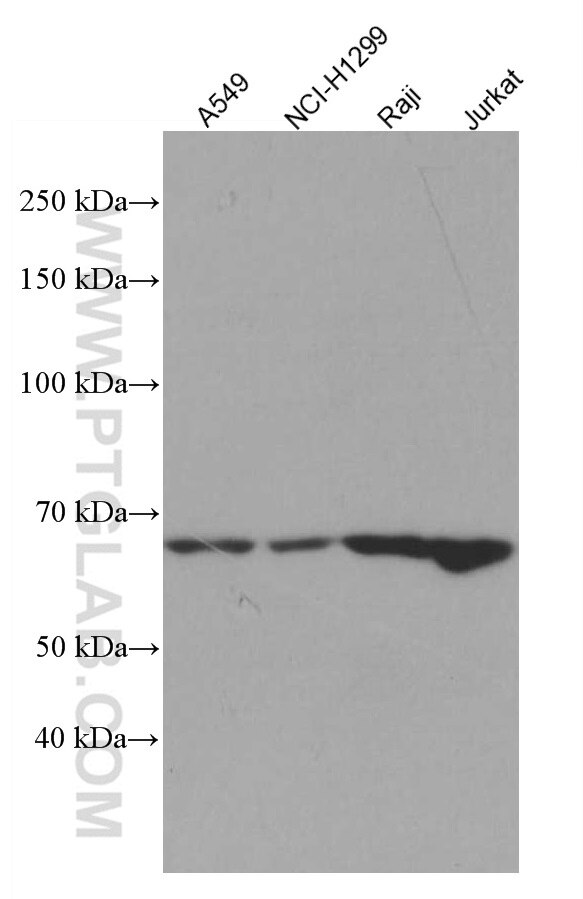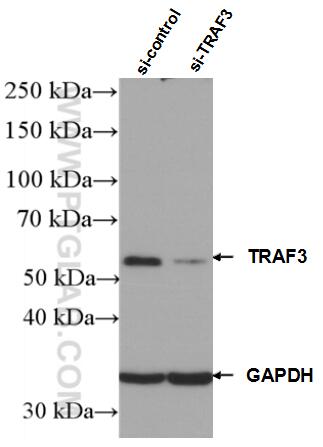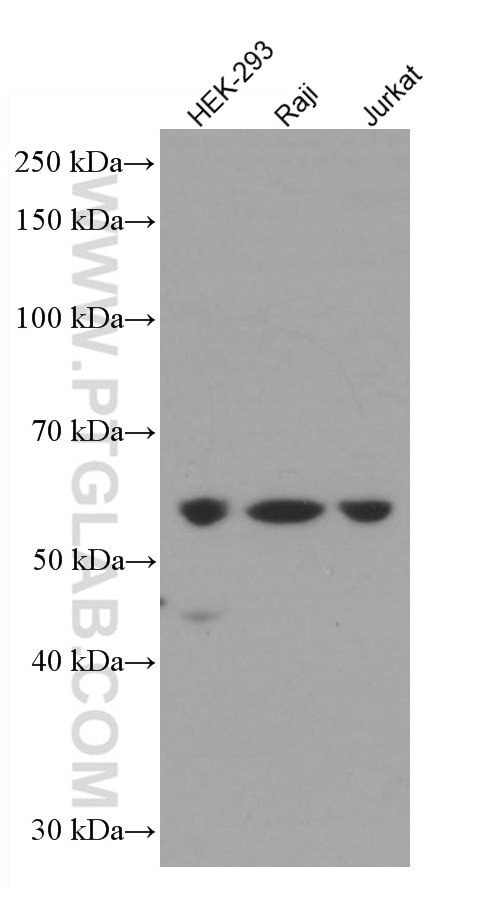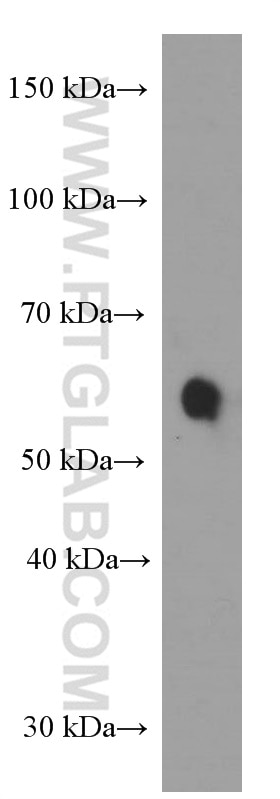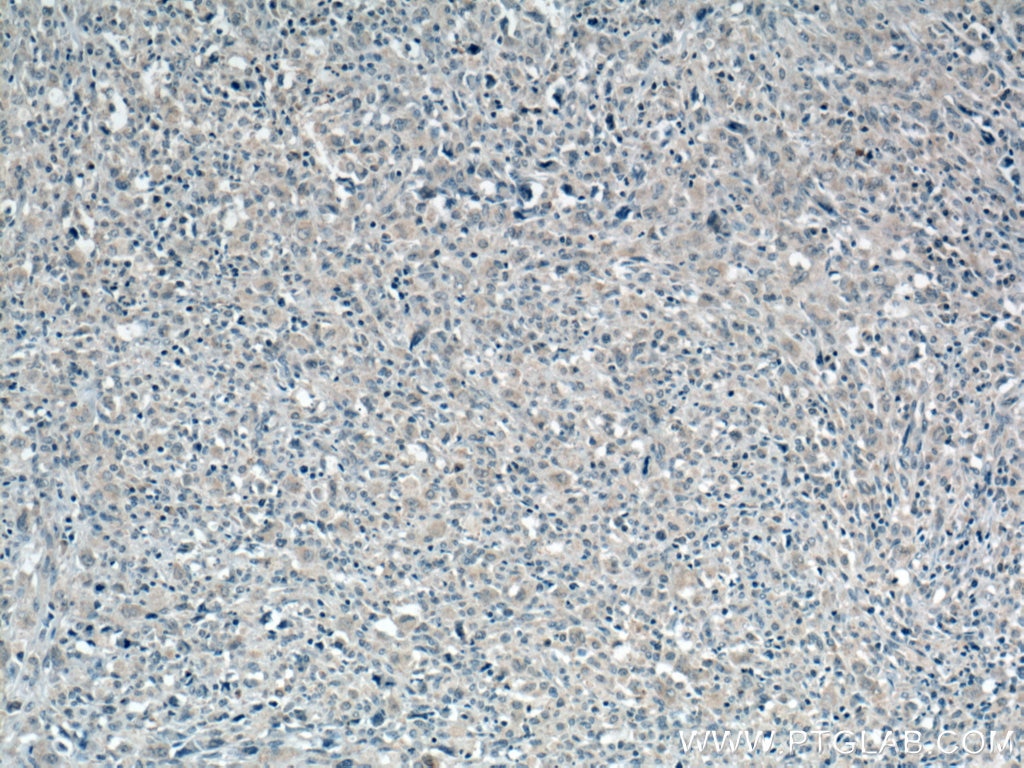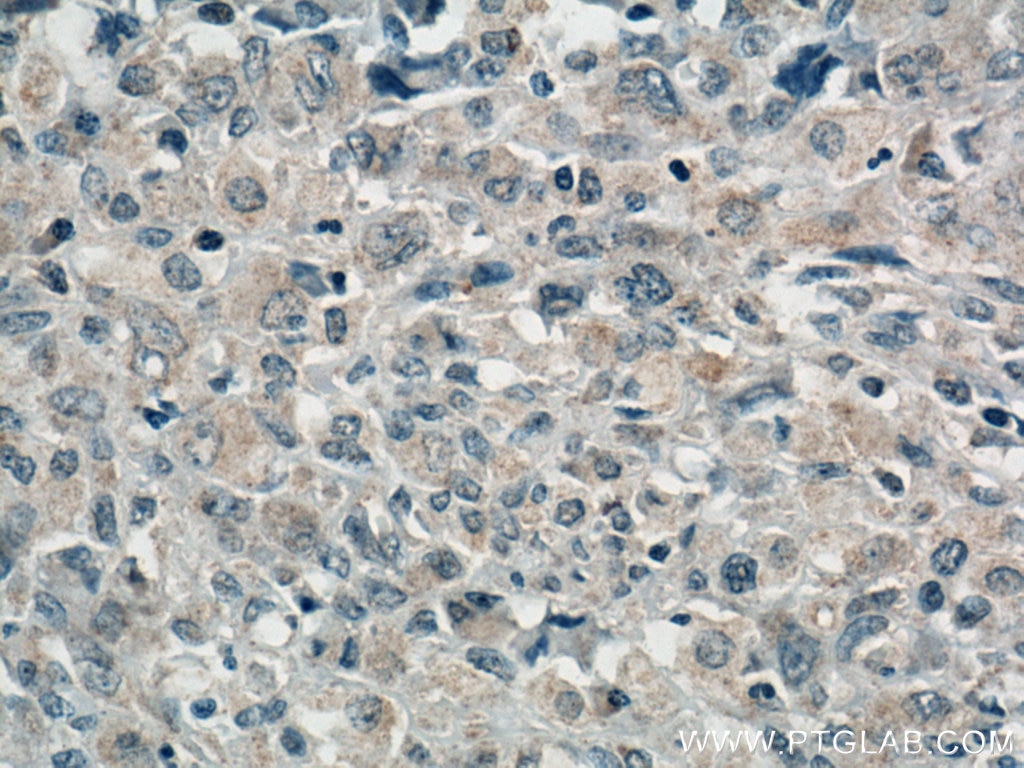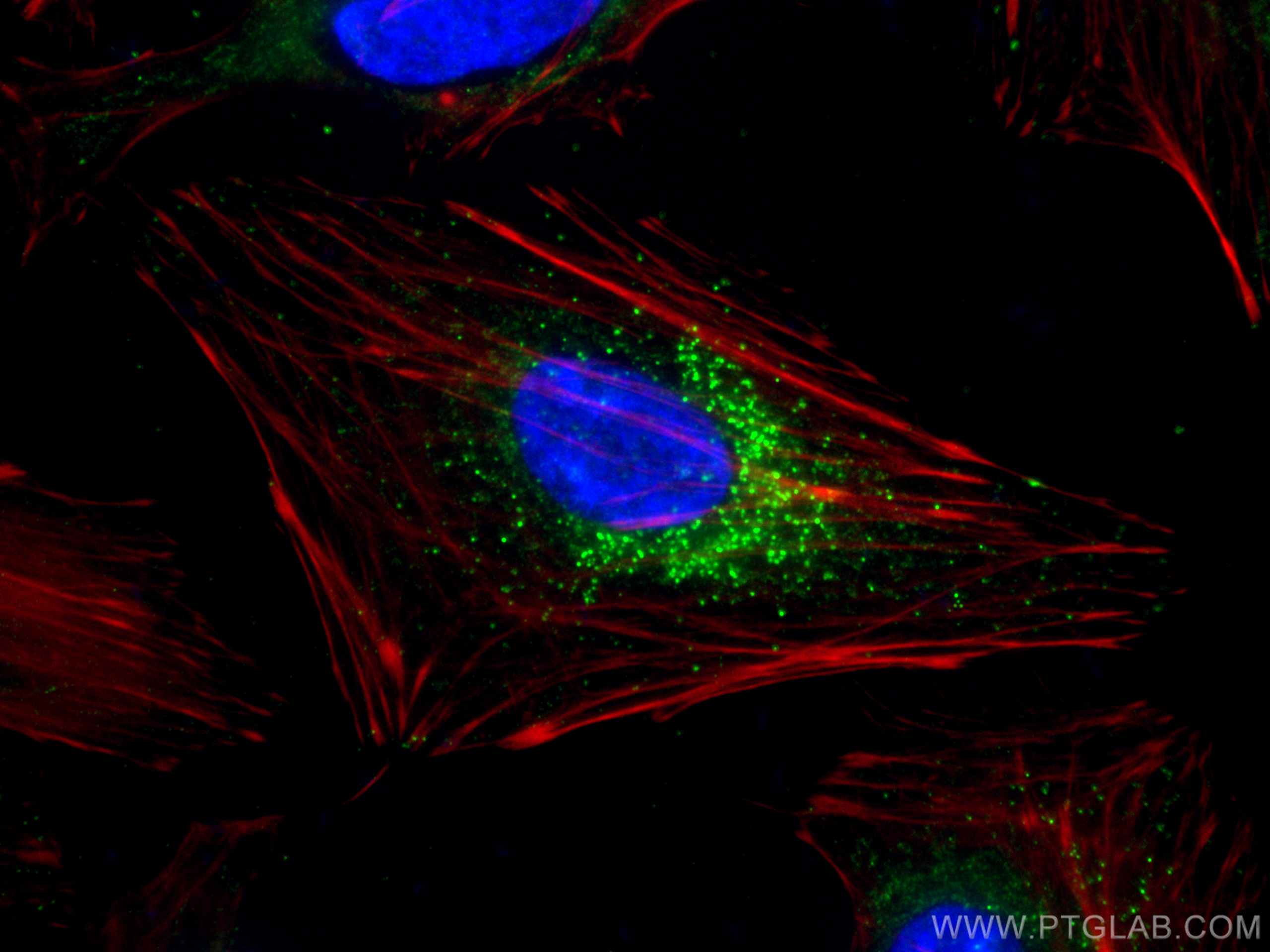- Featured Product
- KD/KO Validated
TRAF3 Monoklonaler Antikörper
TRAF3 Monoklonal Antikörper für WB, IHC, IF/ICC, ELISA
Wirt / Isotyp
Maus / IgG2a
Getestete Reaktivität
human und mehr (1)
Anwendung
WB, IHC, IF/ICC, IP, CoIP, ELISA
Konjugation
Unkonjugiert
CloneNo.
1E3F4
Kat-Nr. : 66310-1-Ig
Synonyme
Geprüfte Anwendungen
| Erfolgreiche Detektion in WB | A549-Zellen, HEK-293-Zellen, Jurkat-Zellen, mit LPS behandelte U-937-Zellen, NCI-H1299-Zellen, Raji-Zellen |
| Erfolgreiche Detektion in IHC | humanes Lymphomgewebe Hinweis: Antigendemaskierung mit TE-Puffer pH 9,0 empfohlen. (*) Wahlweise kann die Antigendemaskierung auch mit Citratpuffer pH 6,0 erfolgen. |
| Erfolgreiche Detektion in IF/ICC | HeLa-Zellen |
Empfohlene Verdünnung
| Anwendung | Verdünnung |
|---|---|
| Western Blot (WB) | WB : 1:500-1:2000 |
| Immunhistochemie (IHC) | IHC : 1:200-1:800 |
| Immunfluoreszenz (IF)/ICC | IF/ICC : 1:200-1:800 |
| It is recommended that this reagent should be titrated in each testing system to obtain optimal results. | |
| Sample-dependent, check data in validation data gallery | |
Veröffentlichte Anwendungen
| KD/KO | See 1 publications below |
| WB | See 13 publications below |
| IHC | See 1 publications below |
| IF | See 3 publications below |
| IP | See 3 publications below |
| CoIP | See 1 publications below |
Produktinformation
66310-1-Ig bindet in WB, IHC, IF/ICC, IP, CoIP, ELISA TRAF3 und zeigt Reaktivität mit human
| Getestete Reaktivität | human |
| In Publikationen genannte Reaktivität | human, Maus |
| Wirt / Isotyp | Maus / IgG2a |
| Klonalität | Monoklonal |
| Typ | Antikörper |
| Immunogen | TRAF3 fusion protein Ag12185 |
| Vollständiger Name | TNF receptor-associated factor 3 |
| Berechnetes Molekulargewicht | 568 aa, 64 kDa |
| Beobachtetes Molekulargewicht | 64 kDa |
| GenBank-Zugangsnummer | BC075087 |
| Gene symbol | TRAF3 |
| Gene ID (NCBI) | 7187 |
| Konjugation | Unkonjugiert |
| Form | Liquid |
| Reinigungsmethode | Protein-A-Reinigung |
| Lagerungspuffer | PBS with 0.02% sodium azide and 50% glycerol |
| Lagerungsbedingungen | Bei -20°C lagern. Nach dem Versand ein Jahr lang stabil Aliquotieren ist bei -20oC Lagerung nicht notwendig. 20ul Größen enthalten 0,1% BSA. |
Hintergrundinformationen
TNF receptor-associated factor 3 (TRAF3) has many alternative names including CAP-1, CD40 receptor-associated factor 1(CRAF1), CD40-binding protein(CD40BP) and LMP1-associated protein 1 (LAP1). TRAF3 regulates pathways leading to the activation of NF-kappa-B and MAP kinases, and plays a central role in the regulation of innate immune response. It modulates signaling pathways leading to the production of cytokines and interferon. As an essential constituent of several E3 ubiquitin-protein ligase complexes, TRAF3 promote 'Lys-63'-linked ubiquitination of target proteins. Moreover, TRAF3 undergoes both 'Lys-48'-linked and 'Lys-63'-linked ubiquitination in response to various stimuli and is deubiquitinated by OTUB1, OTUB2 and OTUD5.
Protokolle
| PRODUKTSPEZIFISCHE PROTOKOLLE | |
|---|---|
| WB protocol for TRAF3 antibody 66310-1-Ig | Protokoll herunterladen |
| IHC protocol for TRAF3 antibody 66310-1-Ig | Protokoll herunterladenl |
| IF protocol for TRAF3 antibody 66310-1-Ig | Protokoll herunterladen |
| STANDARD-PROTOKOLLE | |
|---|---|
| Klicken Sie hier, um unsere Standardprotokolle anzuzeigen |
Publikationen
| Species | Application | Title |
|---|---|---|
Am J Obstet Gynecol microRNA-322 overexpression reduces neural tube defects in diabetic pregnancies | ||
Clin Transl Med Hypoxic colorectal cancer-derived extracellular vesicles deliver microRNA-361-3p to facilitate cell proliferation by targeting TRAF3 via the noncanonical NF-κB pathways. | ||
mBio ASB3 expression aggravates inflammatory bowel disease by targeting TRAF6 protein stability and affecting the intestinal microbiota | ||
Free Radic Biol Med Virtual screening identified natural Keap1-Nrf2 PPI inhibitor alleviates inflammatory osteoporosis through Nrf2-mir214-Traf3 axis. | ||
Front Immunol Swine Acute Diarrhea Syndrome Coronavirus Nucleocapsid Protein Antagonizes Interferon-β Production via Blocking the Interaction Between TRAF3 and TBK1. | ||
Bioorg Chem Synthesis and anti-inflammatory activity of paeonol derivatives with etherized aryl urea by regulating TLR4/MyD88 signaling pathway in RAW264.7 cell. |
